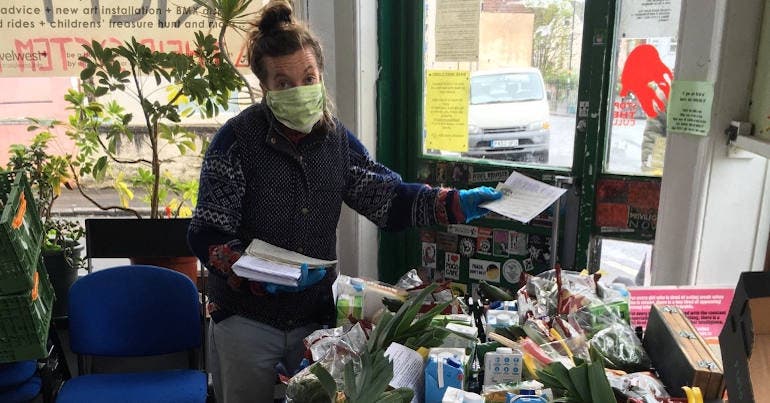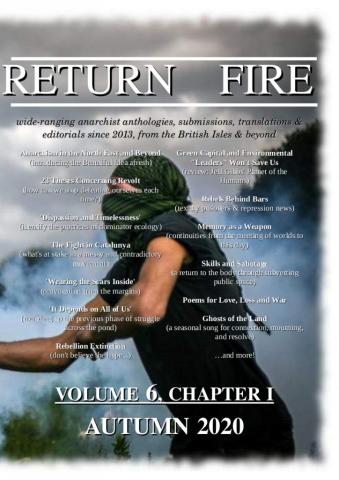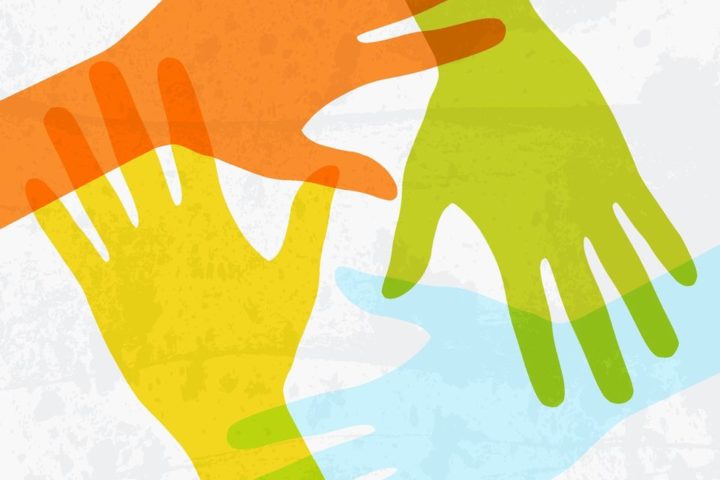Since the beginning of the UK coronavirus (Covid-19) pandemic, tens of thousands of people have lost their lives. But the coronavirus crisis is not only a health crisis, it has had far reaching effects on people’s lives and livelihoods.
The government response is failing to meet community needs in many ways. Workers have been left with insufficient personal protective equipment (PPE), hospitals are under-equipped, coronavirus tests unavailable.
Many people who have lost their livelihoods are suffering. People still remain on the streets during lockdown, despite government promises to house the homeless.
Across the UK, communities have come together to fill the gaps where the state is failing to meet people’s basic needs. Thousands of mutual aid groups have been created; solidarity funds have been set up in many areas to collectively support people through financial difficulties; people have formed collectives to make PPE for NHS workers, and grassroots projects have come together to meet people’s food needs.
The Canary has carried out exclusive interviews with community organisers from the Cooperation Birmingham solidarity Kitchen, Cooperation Kentish Town, and Bristol’s BASE & Roses (B&R) mutual aid food distribution project. This is part one of a two part series looking at these mutual aid initiatives.
State strategy was “totally inadequate”
We asked John from Cooperation Birmingham what inspired them to start the project. John told us:
As it became clear in February and early March that the state’s coronavirus strategy was totally inadequate for taking care of the wellbeing of working class people, we had to go into mutual aid disaster relief mode.
Inspiration
But the idea for Cooperation Birmingham was already in people’s minds when the pandemic struck. John and others had been inspired by the revolutionary strategy of Cooperation Jackson in the US.
Cooperation Jackson is an attempt to build community autonomy and resilience through establishing a network of workers’ cooperatives. The group also seeks to develop collective working class education in Jackson, Mississippi. The vision for Cooperation Jackson was born out out of the struggle for Black self determination in Mississippi. According to Cooperation Jackson’s website:
Cooperation Jackson’s basic theory of change is centred on the position that organizing and empowering the structurally under and unemployed sectors of the working class, particularly from Black and Latino communities, to build worker organized and owned cooperatives will be a catalyst for the democratization of our economy and society overall.
Cooperation Towns
Cooperation Jackson has already inspired a number of radical projects in the UK, based on building grassroots infrastructure that meets the needs of communities. This infrastructure forms part of a strategy of building community counter-power to the state.
One such project is Cooperation Kentish Town, which was set up in December 2019, and established a food co-op at a community centre on the Ingestre Road estate. The Canary spoke to Shiri Shalmy of Cooperation Kentish Town, who told us that before the pandemic, members of the co-op organised food distribution for 30 households on the estate.
The bulk of the food was sourced for free from supermarket surplus, supplemented by a membership fee of £3 a week. Members met regularly to collectively run the co-op in a system based on “need, not transaction”.
When the coronavirus pandemic began, Cooperation Kentish Town was well placed to respond, and it began providing free food parcels to people across Camden. Shalmy told us that at present, the group distributes to at least 150 homes.
Cooperation Kentish Town has set up the Cooperation Towns network, and has inspired several similar Cooperation Town projects, for example in Hull, Liverpool, Bristol, Birmingham, Dorchester and Hackney.
‘A more practical form of resistance’
Shalmy told The Canary:
The impetus for Cooperation Kentish Town came from a desire to move away from the left’s tendency for a performative type of activism (big rallies, spectacular direct actions) to a more practical form of resistance. The aim was to develop a working infrastructure through which our communities can develop our own resilience and, when the time comes, resistance – to estate demolitions, to cuts to services, to the privatisations of our public institutions on a local and world level.
A community that is already organising to meet its basic needs, is going to be stronger when the developers come to grab land and disperse people. In that sense, the very act of feeding ourselves, together, is an act of resistance.
‘Base-building and mutual aid infrastructure’
Both Cooperation Jackson and Cooperation Kentish Town provided the inspiration for Cooperation Birmingham’s response to the coronavirus crisis. According to John from Cooperation Birmingham:
The general idea behind Cooperation Birmingham had been on our minds for a few months – we had been very impressed by the achievements of Cooperation Jackson, and we were beginning to see a way forward for the Left in base-building and mutual aid infrastructure, rather than activist networking or electoral projects.
Base-building is a term used to describe radical political organising that seeks to build a base of support within communities.
‘Mutual aid food delivery service’
Cooperation Birmingham began delivering food to people who needed it from a local cooperative cafe. According to John:
At the moment our biggest project is the Solidarity Kitchen, a mutual aid food delivery service running [out] of the Warehouse Cafe. Since being reopened a bit over a year ago as a workers’ cooperative, the Warehouse Cafe [has] become a great piece of infrastructure for the Left. Thanks to this, we were able to convert it in a very short period from being a commercial cafe/restaurant to a delivery hub, staffed by furloughed workers and a team of people giving time for free to prepare and deliver food. Now we are serving around a thousand… free meals each week to people who are isolated by the coronavirus, all over Birmingham.
But Cooperation Birmingham’s plans are more ambitious than just food distribution. John told us:
We also have other projects which we hope will grow over time and help us build the concept of a solidarity economy that inspired us in Jackson. For instance we have started manufacturing surgical masks which can be used by our workers and also our meal recipients.
We already have a functioning distribution system with around fifty drivers and cyclists, so we hope to be able to deliver masks around the city as needed.
Cooperation Birmingham is already planning beyond the current crisis:
We are also making plans for other, more long-term projects – a delivery driver cooperative to displace the precarity of Uber and Deliveroo, and a community garden to begin the long process of local common food production.
‘Yes, it is bread we fight for — but we fight for roses, too!’
The BASE & Roses (B&R) project was set up in Bristol shortly after the pandemic started to bite. B&R is a radical food distribution project run out of the Base for Anarchy and Solidarity in Easton (or BASE), an anarchist social centre which was established 25 years ago. ‘BASE & Roses’ is a play on words, referencing the old feminist workers’ movement slogan: “Yes, it is bread we fight for — but we fight for roses, too!”
The Canary interviewed several of the B&R crew. One of them, Todd, told us about the motivations for setting up the project:
We set up BASE & Roses to add our efforts to tackling food poverty across Bristol. We wanted to put anarchist organising into practice to help meet people’s basic needs. [Needs] which clearly the state and capitalism are not interested in. While food poverty is often cynically presented by those in power as a result of the pandemic, we know that it’s a normal feature of the system that treats people as expendable in the endless pursuit of profit. This is absolutely nothing exceptional or new.
We asked Todd how many people B&R provides food for. He told us:
It’s difficult to say how many people we currently provide free food for but we deliver food boxes to over 100 addresses and meals to around 60 people each week. We are in the process of doubling our meals output.
‘Solidarity not charity’
One of the key principles of B&R is that the project is about mutual aid and solidarity, not charity. We asked Bobby, another part of the B&R crew, what this meant to him. He explained by quoting American feminist writer bell hooks:
Solidarity is not the same as support. To experience solidarity, we must have a community of interests, shared beliefs and goals around which to unite, to build Sisterhood.
Support can be occasional. It can be given and just as easily withdrawn. Solidarity requires sustained, ongoing commitment.
Todd described how B&R was critical of a charity approach to meeting community needs:
We want to make it clear that we are equals and all that we do is with solidarity at its core… We will never place ourselves above the people we’re showing solidarity with and we recognise that while today we give out free food, tomorrow it could be us that has a need for that food or some other form of solidarity.
Ash, another organiser with B&R, describes how damaging a charitable approach can be:
Traditional charity can be quite paternalistic, and can keep the power and privilege with people who already have it, rather than a radical redistribution of power or any longer lasting changes in society, which is what we ultimately want and are fighting for. As anarchists, we believe that people themselves know best what they need and how to improve their situations.
Grassroots support for the homeless
One motivation for the project was to provide food to homeless people in Bristol. Lucy, another member of the B&R crew, explained:
A lot of Bristol’s shelters have been shut down throughout the pandemic (and some aren’t even operational all year anyway).
According to Ash:
Some homeless people have been relying on begging to get food and money, and now there are not many people passing them, and those who do are more reluctant to stop or come close.
While some homeless people have been moved into hostels, this doesn’t work for everyone; and many hostels lack cooking facilities, so people are hidden inside but still don’t have access to enough food.
Lucy agrees:
Of course there are many people that are still on the streets and as so many offices are told to ‘work-from-home’ and the general public told to keep off the streets, these folks are forgotten about even more. Begging isn’t possible when the city is empty.
Bobby told us that, as well as the hot meals and fresh food boxes, B&R is providing boxes of non-perishable snack food to people who are on the streets, in tents or in squats and who do not have access to a kitchen or refrigerator. These boxes have also proved useful in supplementing the meagre meals provided by some of the hostels and hotels that homeless people have been placed in.
No means-testing
Another thing which sets the grassroots mutual aid model apart from other food-based projects is that they do not ask people to prove that they need support.
Todd from B&R explains why:
It’s gross that so many people are forced to prove their poverty and justify why they should get help. It’s no surprise that so many people have been pushed over the edge by, or left with nothing as they can’t face the seemingly endless forms of endless government intrusions and interrogations in the name of means-testing.
We have no interest in reproducing the shitty power dynamic of those with the resources deeming who is worthy of support and who is not. We trust that anyone who asks us for help and support needs it. And we will give it freely. Simple as that.
‘This is where making change can start’
The mutual aid response to the coronavirus pandemic has often been inspiring. According to Ash:
It’s been really encouraging seeing the spread of mutual aid networks in the UK, and at a street or very local level it’s been great seeing people getting to know their neighbours better. This is where making change can start.
While as Anarchists we’re not surprised that the government is full of shit, a lot of people are rightly disappointed by the Tory government’s paltry response to the crisis, and are looking for better ways to move forward.
Ash takes inspiration from the struggle of the Black Panthers in the US:
Food-based activism rooted in communities has a long history, for example the Black Panthers’ free breakfast programme.
Anarchism can seem alien, scary or theoretical (lots of people pass our social centre every day and never go in or get to know what it’s about), but at its heart, it’s about responding to basic needs and working together to look after everyone in our communities. We hope that this project is a more visible demonstration of what our politics and values are.
‘More prepared to keep fighting’
Ash is hopeful that the mutual aid response in Bristol will enable the community to be stronger in facing future struggles:
We hope to come out of the pandemic having been able to help some people, but also having made some deeper links in the local community and feeling more prepared to keep fighting for a better world with those around us, and to have made the struggle more intersectional and inclusive as a result.
Featured Image provided to The Canary by BASE & Roses
*Some of the names in this article are pseudonyms
Get involved
Tom Anderson is part of the Shoal Collective, a cooperative producing writing for social justice and a world beyond capitalism. Twitter: @shoalcollective.
- Find out more about Cooperation Towns.
- Read about Cooperation Birmingham and support their solidarity kitchen.
- Check out Bristol’s BASE&Roses project and donate to their JustGiving page.




